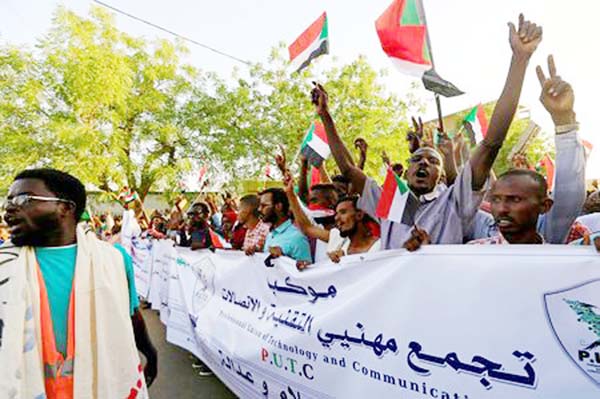
Reuters, Khartoum :
Sudan’s ruling Transitional Military Council (TMC) warned on Monday against protesters blocking roads and limiting the movement of citizens as protests continued after president Omar al-Bashir was forced from power.
The TMC also said it was unacceptable that some young people were exercising the role of the police and security services, in violation of the law, a reference to youths who have been searching protesters taking part in a sit-in outside the Defense Ministry.
The TMC and the opposition have traded threats since Sunday, with the Sudanese Professionals’ Association (SPA), the main organizer of the protests, saying it would suspend talks with the Council. “We have decided to opt for escalation with the military council, not to recognize its legitimacy and to continue the sit-in and escalate the protests on the streets,” Mohamed al-Amin Abdel-Aziz of the SPA told crowds outside the Defense Ministry on Sunday.
The protesters have kept up the sit-in outside the Ministry since Bashir was removed by the military on April 11 and have demonstrated in large numbers in recent days, pressing for a rapid handover to civilian rule.
TMC head Abdel Fattah al-Burhan told state TV on Sunday that the formation of a joint military-civilian council, one of the activists’ demands, was being considered. “The issue has been put forward for discussion and a vision has yet to be reached,” he said.
Saudi Arabia and the United Arab Emirates said on Sunday they had agreed to send Sudan $3 billion worth of aid, throwing a lifeline to the country’s new military leaders.
Demonstrators entering the site have to go through several layers of checks, including personal frisks and searching of their bags, an AFP correspondent reported. Protesters have accused the military council of being little different from the ousted regime of veteran leader Omar al-Bashir who was topped by the army on April 11 following months of demonstrations.
Since then a 10-member military council led by Burhan has taken power.
Protesters want the council to be dissolved and to hand power to a transitional civilian government.
Bashir survived several armed rebellions, economic crises, and attempts by the West to turn him into a pariah during his 30-year rule before he was toppled in a military coup.
At a sit-in outside Sudan’s Ministry of Defence that began on April 6, protesters stood besides posters of Bashir that called on the ICC to put him on trial.
The Sudanese Professionals’ Association, leading the protests, has called for holding Bashir and members of his administration to account, a purge of corruption and cronyism and easing an economic crisis that worsened during Bashir’s last years in power.
On Wednesday, Sudan’s transitional military council ordered the central bank to review financial transfers since April 1 and to seize “suspect” funds, according to state news agency SUNA.
The council also ordered the “suspension of the transfer of ownership of any shares until further notice and for any large or suspect transfers of shares or companies to be reported” to authorities.

